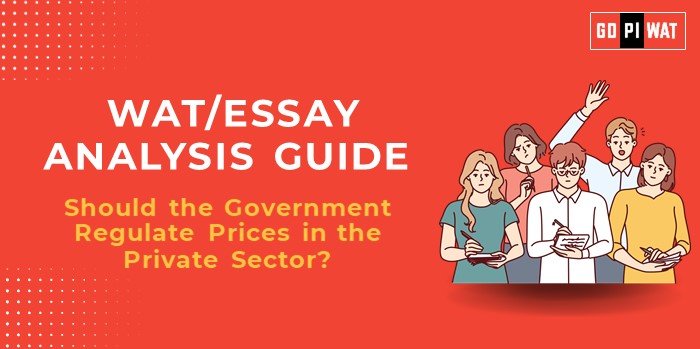📋 WAT/Essay Analysis Guide: Should the Government Regulate Prices in the Private Sector?
🌐 Understanding the Importance of Price Regulation
The debate on price regulation explores a fundamental trade-off between social welfare and market efficiency. With rising costs in essential sectors, it’s vital to assess the role of government in regulating prices to ensure both consumer protection and economic stability.
📝 Effective Planning and Writing
- ⏱️ Time Allocation:
- Planning: 5 minutes
- Writing: 20 minutes
- Review: 5 minutes
- 🔍 Preparation Tips:
- Review case studies like rent controls in U.S. cities and EU energy price caps for examples of both success and unintended consequences.
💡 Introduction Techniques for Essays
- Contrast Approach: “While price controls can provide stability in essential sectors, they also risk stifling innovation and lowering quality in highly regulated markets.”
- Solution-Based Approach: “Amid rising costs, governments worldwide are considering price regulation, but selective intervention might mitigate market distortions.”
- Historical Perspective: “From WWII-era controls to modern rent regulations, price control history reveals both the potential and limitations of government intervention.”
📊 Structuring the Essay Body
✅ Arguments in Favor of Government Price Regulation
- 👥 Consumer Protection: Monopolistic markets can set high prices, impacting consumer welfare. Rent control policies, for instance, keep housing affordable in high-demand areas.
- 🛠️ Correcting Market Failures: By capping harmful product prices, governments can reduce societal costs associated with negative externalities.
- ⚖️ Economic Stability: Temporary price controls during crises help stabilize essentials, as seen with EU energy price caps amid global supply disruptions.
⚠️ Arguments Against Government Price Regulation
- 🔍 Market Distortions: Price caps can lead to shortages if set too low, as seen in some rent-controlled housing markets where supply fails to meet demand.
- 🚫 Black Markets: Artificial price restrictions can incentivize illegal markets, which undermines the policy’s intended effects.
- ⚙️ Quality and Innovation Reduction: Price caps may reduce incentives for innovation, particularly in sectors with high R&D costs like pharmaceuticals.
📄 Concluding Effectively
- Balanced Perspective Conclusion: “While price regulation can bring immediate consumer benefits, sustainable policy requires a careful balance to avoid negative economic impacts.”
- Global Comparison Conclusion: “By analyzing both U.S. rent controls and EU energy caps, we see that targeted, context-specific regulation may achieve more balanced outcomes.”
✨ Recommendations for Sustainable Progress
- Selective Price Controls: Apply to sectors with monopolistic tendencies, such as healthcare, where consumer protection is critical.
- Public-Private Partnerships: Develop frameworks where the private sector supports cost reductions without market distortions.
- Incentive-Based Models: Provide subsidies instead of caps, allowing private innovation while making essential goods affordable.


